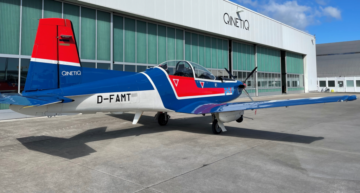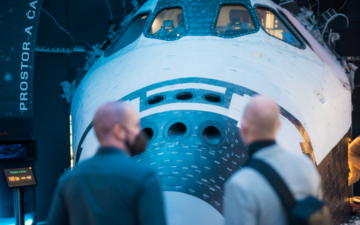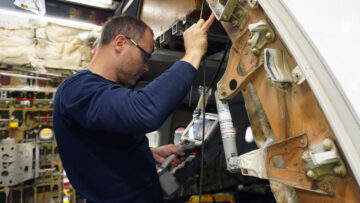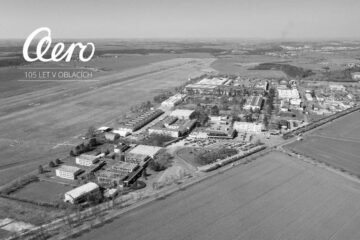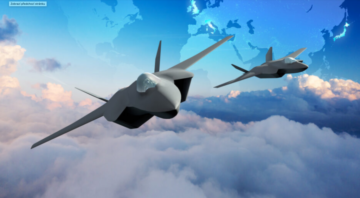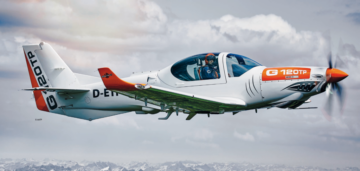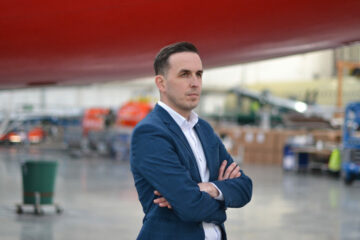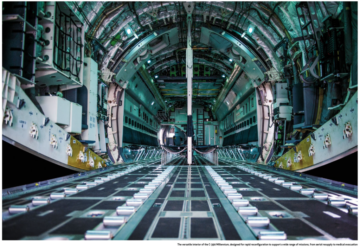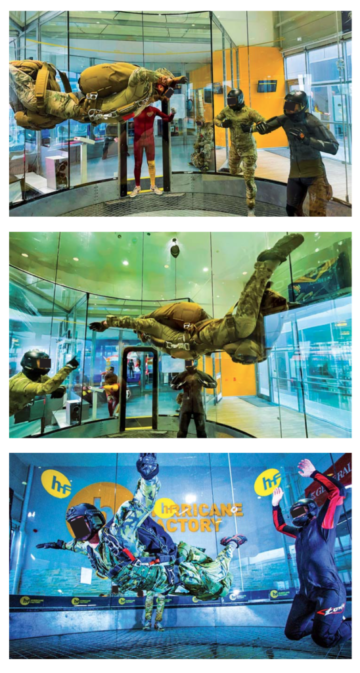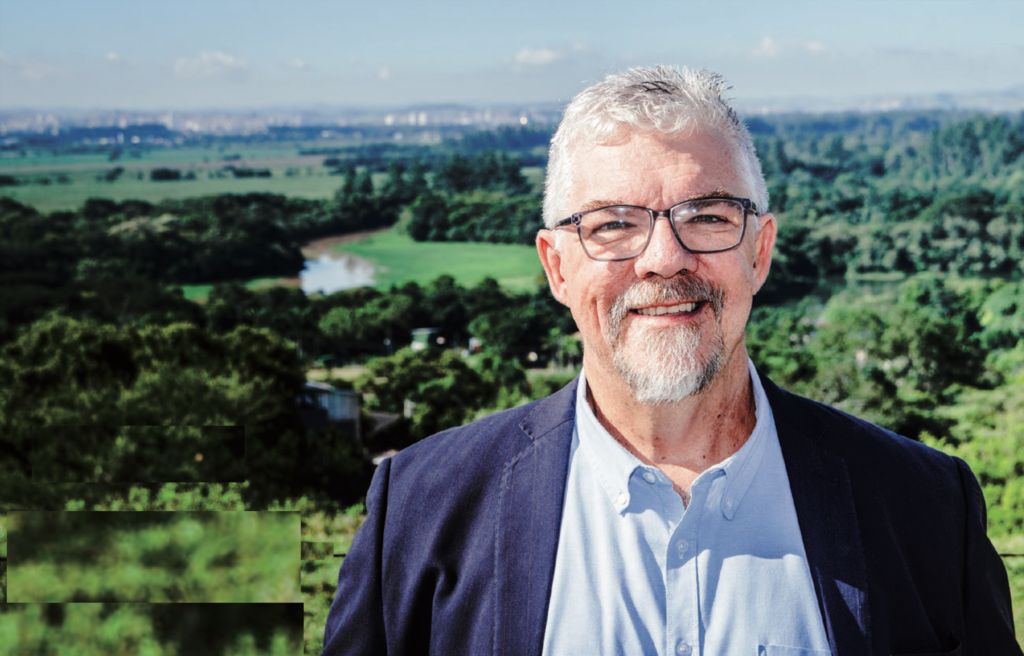
In an exclusive dialogue with ACE (Aerospace Central Europe) Magazine, Luís Colus, the CEO of LHColus, unveils the visionary path that has propelled a once modest engineering office into a beacon of innovation within the global aerospace industry. Founded in 2008, LHColus has transcended its Brazilian roots to emerge as a formidable player in aeronautics, blending cutting-edge technology with a deep commitment to quality and sustainability. This interview offers a rare glimpse into the strategic mindset driving LHColus’s expansion, its pioneering projects, and the collaborative spirit fostering its groundbreaking advancements.
This reservoir of talent is a cornerstone of our operations, enabling us to infuse our projects with unparalleled expertise and innovative solutions. Moreover, Brazil’s robust domestic aerospace industry serves as a fertile ground for experience and ingenuity, further enriching our capacity to deliver exceptional value in our undertakings.
The economic landscape of Brazil, characterized by a lower cost of living and labor compared to many developed nations, presents a strategic advantage. This disparity allows us to offer our international partners high-quality services at a more competitive price point, without compromising on excellence or innovation. It’s a win-win scenario: our partners enjoy significant savings on operating expenses and enhanced profit margins, while we pride ourselves on delivering superior quality and value.
In the global outsourcing market, Brazil stands out for its youthful and competitive sector, offering quality services at prices that undercut more saturated markets without sacrificing expertise or outcomes. The cost-effectiveness of Brazilian engineering, which ranges significantly lower than that in the United States and other developed countries, is a testament to our ability to offer world-class aerospace solutions that are both affordable and cutting-edge.
At LHColus, we believe that our deep roots in Brazil’s rich aerospace tradition and our ability to harness the local talent and economic advantages not only set us apart in the international arena but also strengthen our partnerships across the globe. It’s a reflection of our commitment to excellence, innovation, and the enduring value of Brazilian ingenuity in the aerospace sector.
The Embraer KC-390 program is one of your notable projects. Could you tell us more about LHColus’s role in this program and the impact it has had on the company’s growth?
Our participation in the Embraer KC‑390 program underscores the depth and breadth of LHColus’s capabilities and our profound impact on the aerospace sector. The initial project phase tasked us with the development of troop seats and litters for the KC-390, incorporating a comprehensive array of interface components such as stanchions, beams, hooks, and straps. This design innovation enables the swift reconfiguration of the aircraft’s cabin, transitioning seamlessly between troop transportation and medical evacuation missions without the necessity for specialized tools. This hallmark project marked the inception of a significant and enduring partnership with Embraer, catalyzing an era of substantial technological advancement and infrastructural expansion at LHColus. Our commitment to this partnership has fostered remarkable growth in our technological resources, engineering prowess, and overall competencies, paving the way for a series of subsequent collaborations with Embraer.
Among these subsequent projects was the creation of a robust cargo barrier, known as the Buffer Stop Assembly, engineered to withstand an impressive 53 tons of ultimate forward load. Additionally, we were entrusted with the development of an electronic rack named the Reconfiguration Distribution Box. Our most recent contribution involved the design and manufacture of fuel tubes for the in-flight refueling system, connecting auxiliary fuselage fuel tanks to the wing tanks. Featuring a pioneering double-wall design, these tubes offer redundancy to mitigate potential fuel leakages and accommodate significant tank movements during challenging landing scenarios.
In addition to the ISO 9001:2015 certification, LHColus holds various other quality approvals, such as the Brazilian Airworthiness Authority’s (ANAC) Part 21 Production Certificate and Part 145 Maintenance Certificate, as well as the quality approval to meet the APQP4WIND standard for supplying to the wind energy industry. These approvals further highlight the significance we place on complying with established quality systems.
At LHColus, we operate under the principle that one must always be prepared for an auditor’s unannounced visit. This philosophy ensures that the quality of our products and services is consistently upheld at the highest standards.
With a broad spectrum of services, including aircraft modifications and aerosurvey systems, could you describe the innovation process at LHColus and how it ensures that the final products align with the dynamic requirements of your clients?
Our approach to innovation, particularly exemplified by our most complex aircraft modification project – the cargo conversion of the ERJ-190/195 family into a “Class F” cargo configuration as specified by FAR 25.857, showcases our commitment to meeting our clients’ evolving needs. This quick-change design ingeniously uses the passenger seat tracks to secure 16 cargo nets, complemented by fireproof fabric and an advanced fire detection system utilizing infrared cameras for early heat source detection, surpassing traditional smoke detectors in efficiency and cost-effectiveness. This pioneering solution, currently under patent application, marks its debut in the industry with this specific application.
The development of this system was a collaborative effort with the engineering team of our launch customer, Azul Linhas Aéreas, ensuring the solution precisely met their requirements. With over 20,000 flight hours of accumulated experience across eight modified aircraft, some of which have been seamlessly reconverted to passenger configurations within two to three days, this innovation stands as a testament to our adaptive and client-focused innovation process.
These endeavors are in the process of patenting, both in Brazil and the USA, underlining our commitment to innovation and the protection of our unique solutions, ensuring they meet the specific and evolving needs of our clients.
Aeronautics is an industry characterized by its necessity for continual adaptation and learning. How does LHColus maintain its competitive edge in keeping up with industry trends, and can you share insights into some of the groundbreaking advancements your team is working towards?
“Learning” is not just a concept at LHColus; it’s a cornerstone of our corporate culture. With over 38 years of experience in aeronautical engineering and advanced degrees from prestigious institutions like EESC-USP and ITA, I find myself perpetually on the learning curve, embracing new challenges that contribute to our multidisciplinary teams’ efforts. This relentless pursuit of knowledge ensures we’re always at the forefront, innovating and redefining what’s possible in aeronautics.
A prime example of our commitment to staying ahead was our participation in the FAA International Fire & Cabin Safety Research Conference, where we not only shared insights from one of our successful projects but also had the opportunity to learn about global advancements in fire safety and cabin research. This experience underscores our dedication to continuous improvement and innovation.
Looking ahead, LHColus is excited about several promising projects and partnerships. We’re actively pursuing opportunities with Embraer’s EVE-100, the groundbreaking 100% electric eVTOL, expecting to be selected to contribute to this pioneering project. Furthermore, a leading global airline service provider has shown keen interest in our cargo conversion kit, contemplating its distribution worldwide and its adaptation for other aircraft models like the A320 and B737. This potential partnership could significantly enhance our market reach and enable us to offer cost-effective cargo conversion solutions on a global scale.
Additionally, LHColus is expanding its international footprint, targeting aerospace clusters in the United States and Europe, marking a strategic move to cement our presence in key global markets. These initiatives represent just a fraction of the exciting developments at LHColus, as we continue to push the boundaries of aeronautical engineering and innovation.
As LHColus ventures into new markets such as the US and Europe, we’re eager to learn more about the strategies you employ to adapt and thrive. Could you elaborate on your approach?
Our expansion strategy capitalizes on our vast expertise and experience in both civil and military aviation sectors, aiming to offer superior services within the aerospace clusters of the US and Europe. These regions are renowned for hosting some of the largest and most sophisticated aerospace companies and organizations globally. LHColus’s goal is to establish itself as a competitive and dependable partner within these clusters, contributing our innovative solutions and capabilities to the worldwide aerospace industry.
Given the growing emphasis on sustainability within the aerospace sector, how is LHColus advancing environmentally friendly practices in its operations and manufacturing processes?
In the face of the future, LHColus is deeply committed to addressing environmental challenges and reducing aviation’s ecological footprint. Embracing sustainability involves focusing on fuel efficiency, exploring alternative fuels, employing lightweight materials, enhancing recycling efforts, executing noise reduction operations, engaging in carbon offsetting, and adhering to governmental and international emissions standards to foster sustainable practices. These measures are pivotal for ensuring a sustainable and responsible future for aviation, aligning with global efforts to mitigate environmental impact.
LHColus prides itself on maintaining operations that minimally impact the environment. Our manufacturing processes primarily involve metal, with all scraps and residues being fully recycled, demonstrating our commitment to sustainability. In instances where composite parts production is more polluting, we outsource to specialized companies equipped with the necessary waste treatment facilities to handle such materials responsibly. This approach underscores our dedication to environmental stewardship while maintaining our focus on innovation and quality in the aerospace industry. Lastly, collaboration often acts as a catalyst for innovation.
Could you share how LHColus encourages a culture of collaboration both internally and with external stakeholders to advance aerospace technology?
In the aerospace industry, collaboration is akin to a complex and dynamic partnership, bringing together a multitude of stakeholders to achieve groundbreaking engineering and exploration milestones. At LHColus, we engage in R&D partnerships with leading aerospace companies, academic institutions, and research bodies to pioneer new materials, propulsion systems, avionics, and safety advancements. Our collaboration extends to government agencies, which often support and participate in our research projects, underscoring the significance of joint efforts in technological progression.
Our design and engineering collaborations are particularly notable with major aircraft manufacturers such as Boeing, Airbus, and Embraer. These partnerships involve cross-functional teams focusing on various aspects, including aerodynamics, structural integrity, avionics, systems integration, and simulation modeling. Supply chain collaborations also play a crucial role, where we work alongside Tier 1 suppliers and support Tier 2 and Tier 3 suppliers, fostering an ecosystem of innovation and expertise.
Testing and certification processes see us working closely with regulatory bodies to ensure our products meet the highest safety and performance standards. Our manufacturing and assembly processes embody global collaboration, guided by lean manufacturing principles to enhance efficiency and quality. In maintenance and support, our partnerships with airlines, maintenance providers, and OEMs ensure aircraft remain operational and reliable.
Collaboration in aerospace demands a delicate balance of expertise, trust, and shared objectives. Whether designing a new aircraft, launching a satellite, or exploring distant planets, it is teamwork that propels us to new heights and beyond.
Could you elaborate on your R&D process, particularly how projects are selected and resources allocated for innovation?
LHColus strategically integrates opportunities to contribute to our projects with creating a legacy for future endeavors. This approach is reflected in various activities, such as acquiring new equipment, participating in technical or educational events, or enhancing our technical team’s capabilities through the engagement of specialized consultants. This method has proven effective, allowing us to leverage previous development outcomes to demonstrate our competency and secure new projects.
Moreover, LHColus has established a strong reputation for innovation and quality within the Brazilian market through partnerships with key industry players like Embraer, Avibras, Mectron (now SIATT), Bradar (incorporated by Embraer), and Novaercraft (incorporated by Calidus/UEA). A notable collaboration was with Brazilian Azul Airlines to develop the world’s first Class F freighter aircraft based on the Embraer ERJ-190/-195 platform, a project that introduced several innovative design solutions, including infrared camera-based heat source detection, likely to be adopted broadly in the future.
How does LHColus stay abreast of global trends and technologies?
Situated in the Brazilian Aerospace Cluster, a pioneering force in Brazil and a significant player in Latin America’s aerospace scene, LHColus is at the forefront of technological advancements. The cluster, established in 2006, consolidates Brazil’s aerospace and defense production chain, bringing together over 100 companies and supporting more than 15,000 jobs, with Embraer, the third-largest aircraft manufacturer globally, serving as a cornerstone. This collaborative environment boosts competitiveness in both local and international markets, covering a wide range of sectors from engineering and avionics to logistics and space exploration. The cluster facilitates various initiatives, including training, internationalization, fundraising, and technological innovation, further fostering business development and trade missions. This vibrant and competitive backdrop ensures LHColus remains aligned with global trends and technologies, securing a promising future for the aerospace sector.
As we conclude our engaging dialogue with Luís Colus, we at ACE Magazine are reminded of the unique and enriching experience it has been to delve into the narrative of LHColus. This venture has allowed us to once again cross the geographical confines that typically bound our explorations, reconnecting us with the vibrant aerospace landscape of Brazil—a region we’ve had the pleasure of exploring in past collaborations with industry giants like Embraer.
LHColus, albeit a smaller entity compared to the behemoth that is Embraer, stands as a beacon of innovation, resilience, and ambition, mirroring the pioneering spirit that defines the Brazilian aerospace sector. Their journey from a local startup to an influential player on the global stage underscores the rich tapestry of talent and innovation that Brazil brings to the world of aerospace. It is a privilege to share the story of LHColus, which, much like our partnership with Embraer, highlights the extraordinary contributions of Brazilian enterprises to global aeronautics and innovation. The passion, ingenuity, and forward-thinking approach of the LHColus team, led by Luís Colus, not only inspire us but also amplify our anticipation for what the future holds. As we continue to chart the progress of LHColus alongside our ongoing engagement with aerospace leaders like Embraer, we remain committed to showcasing the diverse and dynamic nature of aerospace innovation, bridging continents and cultures in our quest to highlight the industry’s most compelling stories.
Interviewed and edited by: Katerina Urbanova
Photo credit: Marília Rossi
- SEO Powered Content & PR Distribution. Get Amplified Today.
- PlatoData.Network Vertical Generative Ai. Empower Yourself. Access Here.
- PlatoAiStream. Web3 Intelligence. Knowledge Amplified. Access Here.
- PlatoESG. Carbon, CleanTech, Energy, Environment, Solar, Waste Management. Access Here.
- PlatoHealth. Biotech and Clinical Trials Intelligence. Access Here.
- Source: https://aero-space.eu/2024/03/24/from-local-beginnings-to-global-horizons-the-journey-of-a-brazilian-aerospace-pioneer/
- :has
- :is
- :not
- :where
- $UP
- 000
- 1
- 100
- 15%
- 16
- 2%
- 20
- 2006
- 2008
- 2015
- 21
- 25
- 54
- 66
- a
- ability
- About
- academic
- accommodate
- Accumulated
- ace
- Achieve
- acquiring
- across
- actively
- activities
- acts
- adapt
- adaptation
- adaptive
- addition
- Additionally
- addressing
- adhering
- adopted
- advance
- advanced
- advancement
- advancements
- advancing
- ADvantage
- advantages
- Aeronautics
- Aerospace
- affordable
- again
- agencies
- ahead
- Aiming
- Airbus
- aircraft
- airline
- Airlines
- albeit
- align
- aligned
- aligning
- All
- allocated
- allowed
- Allowing
- allows
- alongside
- also
- alternative
- always
- ambition
- amplify
- an
- and
- anticipation
- apart
- Application
- approach
- approval
- approvals
- ARE
- Arena
- Array
- AS
- aspects
- Assembly
- At
- auxiliary
- aviation
- backdrop
- Balance
- barrier
- based
- BE
- beacon
- been
- behemoth
- being
- believe
- between
- Beyond
- blending
- bodies
- Boeing
- boosts
- both
- bound
- boundaries
- Box
- Brazil
- Brazilian
- breadth
- bridging
- Bringing
- Brings
- broad
- broadly
- buffer
- business
- business development
- but
- by
- cameras
- CAN
- capabilities
- Capacity
- carbon
- Cargo
- Catalyst
- catalyzing
- cement
- central
- central europe
- ceo
- certificate
- Certification
- chain
- challenges
- challenging
- characterized
- Chart
- civil
- class
- clients
- closely
- Cluster
- collaboration
- collaborations
- collaborative
- commitment
- committed
- Companies
- Company’s
- compared
- compelling
- competitive
- competitiveness
- complemented
- complex
- complying
- components
- comprehensive
- compromising
- concept
- conclude
- Conference
- Configuration
- configurations
- Connecting
- consistently
- Consolidates
- consultants
- continents
- continue
- continuous
- contribute
- contributing
- contribution
- contributions
- Conversion
- cornerstone
- Corporate
- Corporate Culture
- Cost
- cost-effective
- could
- countries
- covering
- Creating
- creation
- credit
- Cross
- cross-functional teams
- crucial
- Culture
- cultures
- Currently
- curve
- customer
- cutting-edge
- cutting-edge technology
- Days
- debut
- dedication
- deep
- deeply
- Defense
- Defines
- deliver
- delivering
- delve
- demands
- demonstrate
- demonstrating
- dependable
- depth
- describe
- Design
- designing
- Detection
- develop
- developed
- Development
- developments
- dialogue
- disparity
- Distant
- distribution
- diverse
- does
- Domestic
- driving
- during
- dynamic
- eager
- Early
- Ecological
- Economic
- ecosystem
- Edge
- edited
- educational
- Effective
- efficiency
- effort
- efforts
- eight
- Elaborate
- Electric
- Electronic
- embody
- embracing
- emerge
- Emissions
- emphasis
- employing
- enable
- enables
- enabling
- encourages
- endeavors
- enduring
- energy
- engage
- engagement
- engaging
- engineered
- Engineering
- enhance
- enhanced
- enhancing
- enjoy
- enriching
- ensure
- ensures
- ensuring
- enterprises
- entity
- entrusted
- Environment
- environmental
- environmentally
- environmentally friendly
- equipment
- equipped
- Era
- establish
- established
- Ether (ETH)
- Europe
- events
- evolving
- evtol
- example
- Excellence
- exceptional
- excited
- exciting
- Exclusive
- executing
- exemplified
- expanding
- expansion
- expecting
- expenses
- experience
- expertise
- exploration
- Exploring
- extends
- external
- extraordinary
- faa
- fabric
- Face
- facilitates
- facilities
- family
- far
- Featuring
- fertile
- final
- Find
- Fire
- First
- flight
- Focus
- focusing
- Footprint
- For
- Force
- forefront
- formidable
- Forward
- forward-thinking
- forward-thinking approach
- Foster
- fostered
- fostering
- Founded
- fraction
- friendly
- from
- Fuel
- fuel efficiency
- fuels
- fully
- Fundraising
- further
- Furthermore
- future
- geographical
- giants
- Glimpse
- Global
- global markets
- global scale
- Globally
- globe
- goal
- Government
- government agencies
- governmental
- Ground
- groundbreaking
- Growing
- Growth
- guided
- had
- handle
- harness
- Have
- heights
- high-quality
- highest
- Highlight
- highlights
- holds
- Hooks
- Horizons
- hosting
- HOURS
- How
- HTTPS
- i
- Impact
- impressive
- improvement
- in
- inception
- Including
- Incorporated
- incorporating
- industry
- industry’s
- Influential
- infrastructural
- ingenuity
- initial
- initiatives
- innovating
- Innovation
- innovative
- insights
- inspire
- instances
- institutions
- Integrates
- integration
- integrity
- interest
- Interface
- internally
- International
- Interview
- into
- introduced
- involve
- involved
- involves
- ISO
- ISO 9001
- IT
- ITS
- itself
- Jobs
- joint
- journey
- just
- Keen
- keeping
- Key
- kit
- knowledge
- known
- labor
- landing
- landscape
- largest
- lastly
- Latin
- launch
- launching
- leaders
- leading
- LEARN
- learning
- Led
- Legacy
- Leverage
- lightweight
- like
- likely
- living
- load
- local
- logistics
- lower
- magazine
- maintain
- maintaining
- maintenance
- major
- Manufacturer
- Manufacturers
- manufacturing
- many
- margins
- marked
- Market
- Markets
- marking
- materials
- measures
- medical
- Meet
- meeting
- met
- metal
- method
- Milestones
- Military
- Mindset
- mirroring
- missions
- Mitigate
- modeling
- models
- modest
- Modifications
- modified
- more
- Moreover
- most
- move
- movements
- much
- multidisciplinary
- multitude
- must
- myself
- Named
- NARRATIVE
- Nations
- Nature
- necessary
- necessity
- needs
- Nets
- New
- Noise
- notable
- now
- objectives
- of
- offer
- offering
- Offers
- Office
- offsetting
- often
- on
- once
- ONE
- ongoing
- only
- operate
- operating
- operating expenses
- operational
- Operations
- opportunities
- Opportunity
- or
- organizations
- Other
- our
- ourselves
- out
- outcomes
- outsource
- Outsourcing
- over
- overall
- part
- participate
- participating
- participation
- particularly
- partner
- partners
- Partnership
- partnerships
- parts
- passion
- past
- patent
- path
- Paving
- performance
- phase
- philosophy
- pioneer
- Pioneering
- pivotal
- Place
- Planets
- platform
- plato
- Plato Data Intelligence
- PlatoData
- Play
- player
- players
- pleasure
- Point
- possible
- potential
- practices
- precisely
- prepared
- presence
- presents
- prestigious
- previous
- price
- Prices
- pride
- primarily
- Prime
- principle
- principles
- privilege
- process
- processes
- Production
- Products
- Products and Services
- Profit
- profound
- Program
- Progress
- progression
- project
- projects
- promising
- propelled
- propels
- propulsion
- protection
- proven
- provider
- providers
- prowess
- pursuing
- pursuit
- Push
- quality
- quest
- R&D
- range
- ranges
- RARE
- reach
- recent
- reconnecting
- recycled
- recycling
- Redefining
- reducing
- reduction
- reflected
- reflection
- Refueling
- region
- regions
- regulatory
- relentless
- reliable
- remain
- remains
- remarkable
- Renowned
- represent
- reputation
- Requirements
- research
- resilience
- Resources
- responsible
- responsibly
- Rich
- robust
- Role
- roots
- sacrificing
- Safety
- satellite
- Savings
- Scale
- scenario
- scenarios
- scene
- scraps
- seamlessly
- sector
- Sectors
- secure
- securing
- see
- selected
- Series
- serves
- service
- Service Provider
- Services
- serving
- set
- several
- Share
- shared
- showcases
- showcasing
- shown
- significance
- significant
- significantly
- simulation
- smaller
- Smoke
- solution
- Solutions
- some
- sophisticated
- Source
- Space
- space exploration
- specialized
- specific
- specified
- Spectrum
- spirit
- Stage
- stakeholders
- standard
- standards
- stands
- startup
- States
- stay
- staying
- Stewardship
- Stop
- Stories
- Story
- Strategic
- Strategically
- strategies
- Strategy
- Strengthen
- strong
- structural
- subsequent
- substantial
- successful
- such
- superior
- suppliers
- supply
- supply chain
- supplying
- support
- Supporting
- surpassing
- Sustainability
- sustainable
- SWIFT
- system
- Systems
- Talent
- tank
- Tanks
- tapestry
- targeting
- tasked
- team
- teams
- teamwork
- Technical
- technological
- Technologies
- Technology
- tell
- testament
- than
- that
- The
- The Future
- the world
- their
- These
- they
- this
- three
- Thrive
- Through
- tier
- to
- together
- tons
- tools
- towards
- tracks
- trade
- tradition
- traditional
- Training
- transitioning
- transportation
- treatment
- Trends
- Trust
- two
- typically
- ultimate
- under
- underscores
- unique
- United
- United States
- unparalleled
- Unveils
- us
- USA
- uses
- Utilizing
- value
- various
- Vast
- venture
- Ventures
- vibrant
- visionary
- Visit
- was
- Waste
- Way..
- we
- WELL
- were
- What
- whether
- which
- while
- wide
- Wide range
- Win-Win
- wind
- wind energy
- Wing
- with
- within
- without
- Work
- working
- world
- world-class
- world’s
- worldwide
- years
- you
- Your
- youthful
- zephyrnet


